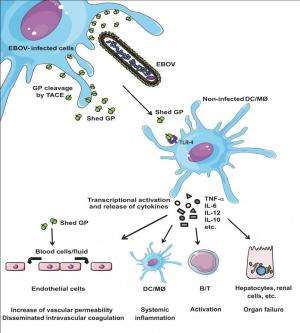An Ebola virus protein can cause massive inflammation and leaky blood vessels

Ebola GP protein covers the virus' surface and is shed from infected cells during infection. A study published on November 20th in PLOS Pathogens reports that shed GP can trigger massive dysregulation of the immune response and affect the permeability of blood vessels
Ebola virus has seven genes. One of them, called GP, codes for two related proteins: a shorter secreted one and a longer one that spans the viral wall and sticks out of its surface. During virus infection, some of the surface GP is cut off by a human enzyme and is subsequently shed from infected cells. High levels of both shed and secreted GP are found in the blood of infected humans and animals.
Rather than working with intact Ebola virus, Viktor Volchkov and colleagues from the Claude Bernard University of Lyon, International Center for Infectiology Research (CIRI), INSERM, France, produced shed and secreted GP in tissue culture and used these proteins to test their effects on human cells.
They found that shed but not secreted GP can bind to immune cells, called macrophages and dendritic cells, both also targets of Ebola virus infection. Upon binding of shed GP, these immune cells start releasing massive quantities of immune-modulators. Both shed GP and these immune-modulators are soluble proteins that can travel in the blood stream, and this might explain how through continuing production and release of shed GP an initial immune response to the virus gets amplified and can spiral out of control, leading to high fever, massive inflammation, and possibly the shock that kills many Ebola patients.
The scientists also found that the effects of shed GP on the immune cells depends on a molecule called TLR-4. Blocking TLR-4 with specific antibodies prior to exposing immune cells to shed GP damped the cells' reaction and eliminated much of the release of immune modulators.
Besides massive and destructive inflammation, fatal Ebola disease is also associated with loss of blood vessel integrity—hence the name Ebola hemorrhagic fever. To examine a possible contribution of GP to these symptoms, the researchers examined the effects of secreted and shed GP on permeability of endothelial cells (which form blood vessels). They found that shed GP directly—as well as through the cocktail of immune-modulators produced by immune cells upon binding of shed GP—can increase permeability of endothelial cells.
While the results of the study need to be confirmed in the context of infected animals or humans, the authors conclude that their data "support a role for EBOV shed GP in the creation of excessive and dysregulated host inflammatory responses and an increased vascular permeability". They also speculate that "anti-TLR4 antibodies could be used to reduce the inflammatory reaction caused by shed GP".
More information: Escudero-Pérez B, Volchkova VA, Dolnik O, Lawrence P, Volchkov VE (2014) Shed GP of Ebola Virus Triggers Immune Activation and Increased Vascular Permeability. PLoS Pathog 10(11): e1004509. DOI: 10.1371/journal.ppat.1004509

















